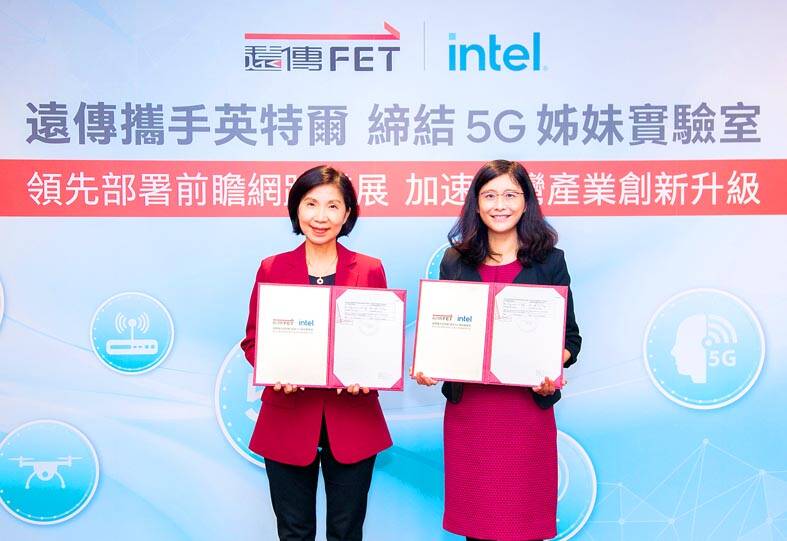Far EasTone Telecommunications Co (遠傳電信) has signed an agreement with Intel Taiwan to jointly research 5G open virtualized radio access networks (ORAN), computer vision and private cellular networks, Far EasTone said in a statement yesterday.
The two companies would pool their 5G know-how to boost network capacity and offer better user experiences for individual and corporate clients, Far EasTone said.
The ORAN-related research would involve developing plans to enable access to experimental networks, and sharing testing systems, software and hardware, it said.

Photo courtesy of Far EasTone Telecommunications Co
The Taipei-headquartered telecommunications firm said Intel would provide access to its Intel Smart Edge Open software toolkit for the project.
Far EasTone said it would also employ Intel’s Early Access Program to incorporate computer vision in smart city and transportation applications.
The two companies would work to incorporate their most advanced technology into digital health, smart manufacturing, and industry 4.0 applications to drive industrial upgrades in Taiwan, Far EasTone said.
Far EasTone president Chee Ching (井琪) said the firm has long endeavored to integrate and employ technologies central to 5G, including big data, artificial intelligence and Internet of Things applications.
Grace Wang (汪佳慧), vice president of Intel Taiwan’s sales and marketing group, said the Early Access Program would enable Far EasTone to develop edge computing and other Internet applications.
Under the agreement, Intel Taiwan would offer access to software such as Intel Geti and the Open Vino toolkit to help Far EasTone develop solutions for corporations to better adopt computer vision in their day-to-day operations, Wang said.

In Italy’s storied gold-making hubs, jewelers are reworking their designs to trim gold content as they race to blunt the effect of record prices and appeal to shoppers watching their budgets. Gold prices hit a record high on Thursday, surging near US$5,600 an ounce, more than double a year ago as geopolitical concerns and jitters over trade pushed investors toward the safe-haven asset. The rally is putting undue pressure on small artisans as they face mounting demands from customers, including international brands, to produce cheaper items, from signature pieces to wedding rings, according to interviews with four independent jewelers in Italy’s main

Macronix International Co (旺宏), the world’s biggest NOR flash memory supplier, yesterday said it would spend NT$22 billion (US$699.1 million) on capacity expansion this year to increase its production of mid-to-low-density memory chips as the world’s major memorychip suppliers are phasing out the market. The company said its planned capital expenditures are about 11 times higher than the NT$1.8 billion it spent on new facilities and equipment last year. A majority of this year’s outlay would be allocated to step up capacity of multi-level cell (MLC) NAND flash memory chips, which are used in embedded multimedia cards (eMMC), a managed

Japanese Prime Minister Sanae Takaichi has talked up the benefits of a weaker yen in a campaign speech, adopting a tone at odds with her finance ministry, which has refused to rule out any options to counter excessive foreign exchange volatility. Takaichi later softened her stance, saying she did not have a preference for the yen’s direction. “People say the weak yen is bad right now, but for export industries, it’s a major opportunity,” Takaichi said on Saturday at a rally for Liberal Democratic Party candidate Daishiro Yamagiwa in Kanagawa Prefecture ahead of a snap election on Sunday. “Whether it’s selling food or

In the wake of strong global demand for AI applications, Taiwan’s export-oriented economy accelerated with the composite index of economic indicators flashing the first “red” light in December for one year, indicating the economy is in booming mode, the National Development Council (NDC) said yesterday. Moreover, the index of leading indicators, which gauges the potential state of the economy over the next six months, also moved higher in December amid growing optimism over the outlook, the NDC said. In December, the index of economic indicators rose one point from a month earlier to 38, at the lower end of the “red” light.